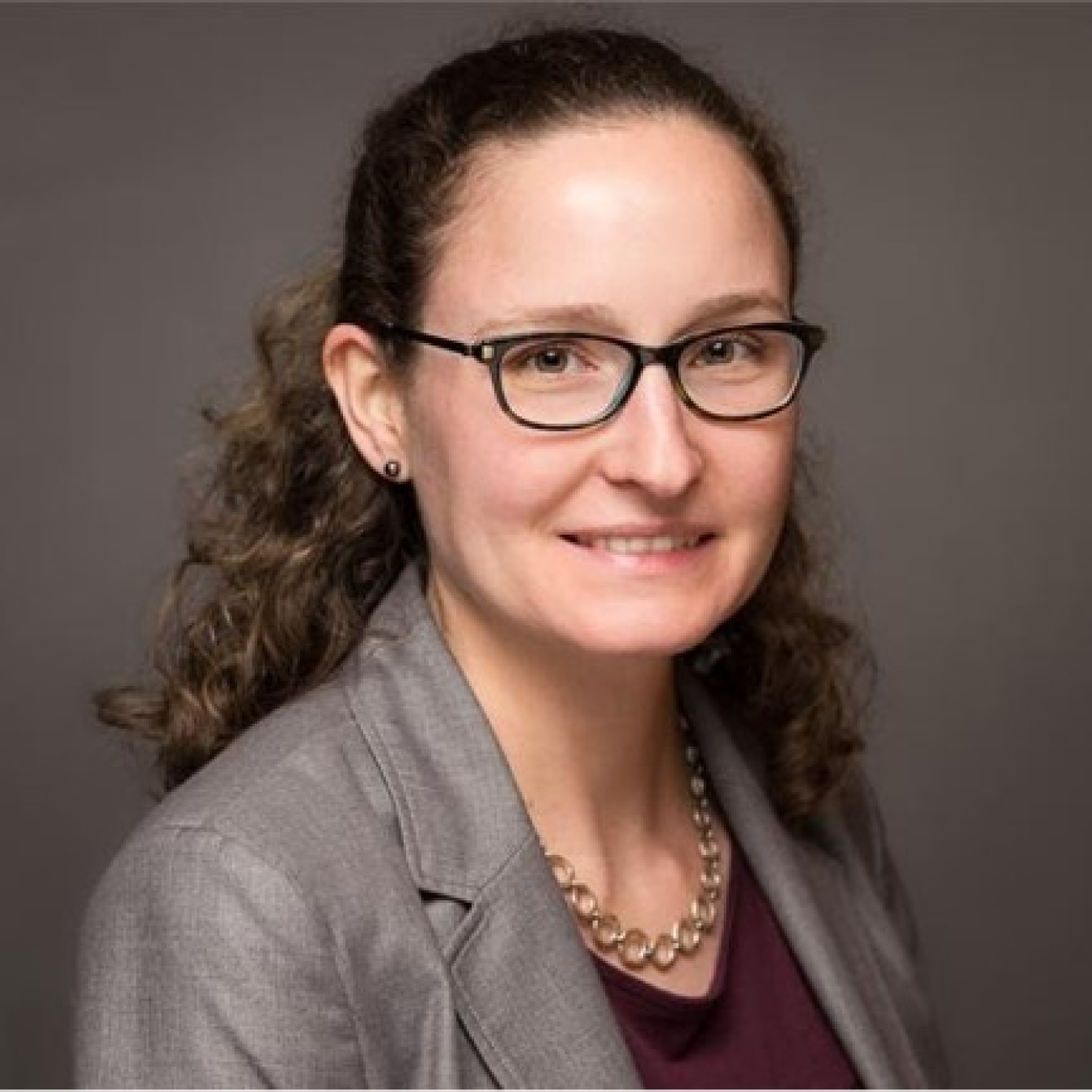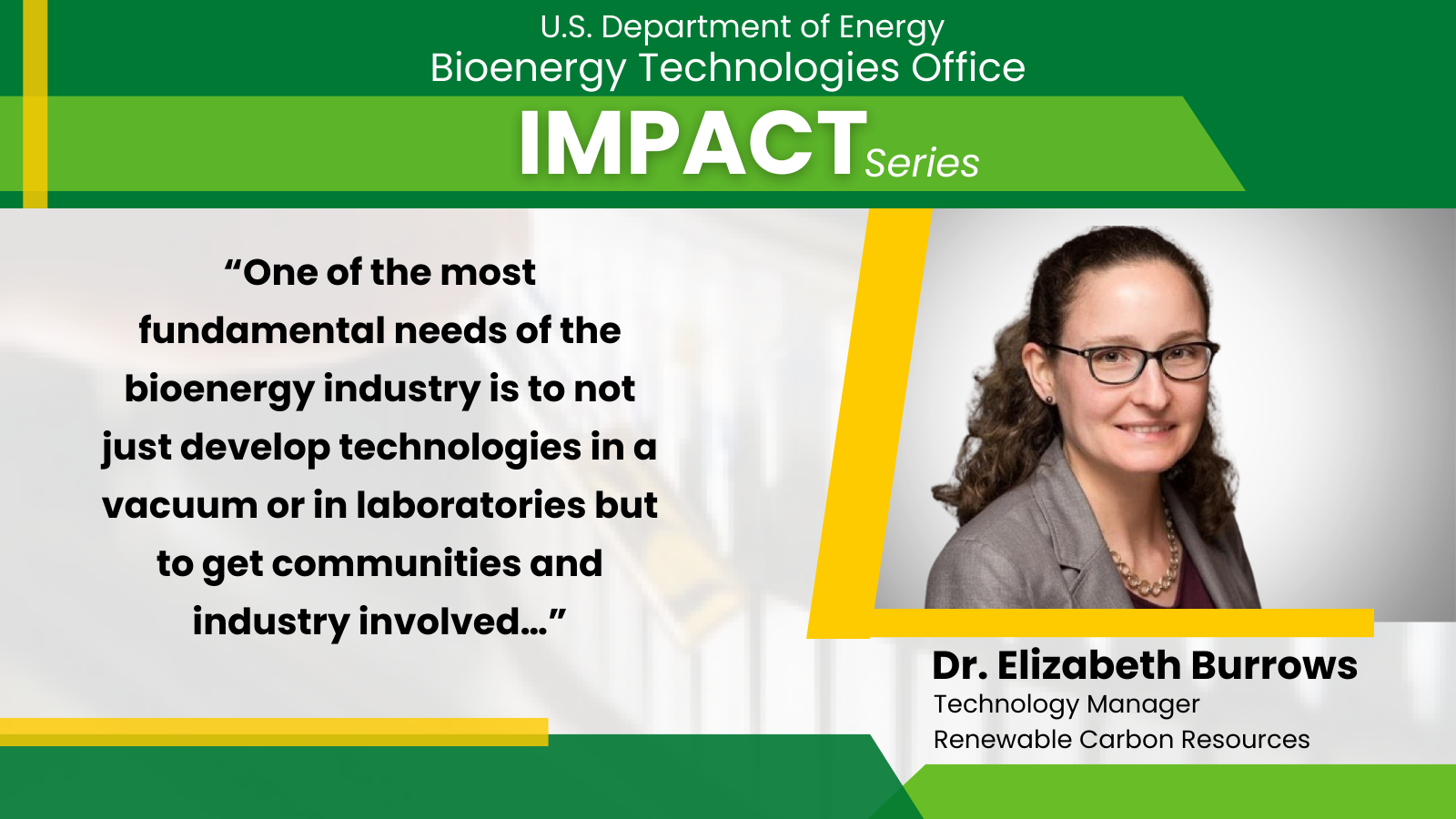BETO investments in research, development, and demonstration (RD&D) have enabled commercial success by supporting technological innovation to build a strong bioeconomy. The U.S. Department of Energy’s (DOE’s) Small Business Innovation Research (SBIR) and Small Business Technology Transfer (STTR) programs foster a culture of cutting-edge advancements, scientific achievements, and entrepreneurship through small business innovation and research.
January 15, 2025Dr. Elizabeth Burrows

Dr. Elizabeth Burrows is a Technology Manager for the Renewable Carbon Resources Program in the U.S. Department of Energy's (DOE's) Office of Energy Efficiency and Renewable Energy's Bioenergy Technologies Office (BETO). Dr. Burrows has been working in various roles at BETO since 2016 and currently serves as BETO’s Small Business Innovation Research (SBIR) coordinator. Before joining BETO, Burrows served as an American Association for the Advancement of Science (AAAS) Science & Technology Policy Fellow at the National Science Foundation.
Dr. Burrows prior work includes 14 years conducting research in algal biofuels and forest and wetland ecosystem science. Her research experience in algal biofuels includes nearly three years at Joule Unlimited, an alternative energy company based in Bedford, MA and postdoctoral research in Chemistry at Princeton and Rutgers Universities, a graduate internship at Pacific Northwest National Laboratory, and a PhD in Biological and Ecological Engineering from Oregon State University.
During graduate school, Burrows also completed an Ecosystem Informatics minor, which followed from her previous position studying forest biogeochemistry at Harvard Experimental Forest, through the Marine Biological Laboratory.
She holds bachelors degrees in Mathematics and Environmental Studies from Mount Holyoke College.

BETO Technology Manager Spearheads Small Business Innovation Research
The U.S. Department of Energy’s (DOE) Bioenergy Technologies Office (BETO) investments in research, development, and demonstration (RD&D) have enabled commercial success by supporting technological innovation to build a strong bioeconomy. DOE’s Small Business Innovation Research (SBIR) and Small Business Technology Transfer (STTR) programs foster a culture of cutting-edge advancements, scientific achievements, and entrepreneurship through small business innovation and research.
Dr. Elizabeth Burrows serves as BETO's lead coordinator for SBIR/STTR. BETO is contributing to the FY25 SBIR/STTR funding opportunity with a Renewable Carbon Resources (RCR) topic and two Conversion Technologies topics jointly with the Industrial Efficiency & Decarbonization Office (IEDO) and Advanced Materials & Manufacturing Technologies Office (AMMTO). Through SBIR/STTR, funding is awarded to a diverse portfolio of startups and small businesses to develop business ideas and champion RD&D private sector commercialization to increase competition, productivity, and economic growth.
“While managing BETO’s SBIR/STTR Program, I am able to bring a perspective from my previous experience working with a small biofuels start-up company. Through the SBIR/STTR program, we recently released Notice of Funding Opportunities (NOFOs) three years in a row that included topics that focused on community engagement as an integral part of developing bioenergy technologies. The selectees engaged with a diverse group of stakeholders, from farmers on adoption of new crops to native Hawaiians on landfill management,” said Burrows.
Dr. Elizabeth Burrows: Scope of BETO Work
Dr. Burrows not only leads SBIR/STTR but has worked with BETO since 2016 and currently oversees RCR projects in feedstock production and supply, sustainable energy crops, feedstock preprocessing for conversion, waste stream valorization, and value-added coproducts. Dr. Burrows is no stranger to environmental sustainability and has a family history connected to her career. “My grandfather has a conservation degree and there’s even a trail in Vermont called Burrows Trail that’s named after my great uncle because our family is deeply involved in nature conservation,” said Dr. Burrows.
She earned B.A.’s in Environmental Studies and Mathematics from Mount Holyoke College, and a Ph.D. in Biological and Ecological Engineering from Oregon State University. She completed her postdoctoral research in algae biofuels and spent time working in a forest studying forest biochemistry. She has also worked in a wetland doing wetland carbon research. In addition, Dr. Burrows participated as an American Association for the Advancement of Science (AAAS) Science and Technology Policy fellow for the National Science Foundation. Following her fellowship, Dr. Burrows worked at BETO where she supported the communications team.
“I’ve been with BETO a little over eight years and worked in various roles. I’ve been extremely lucky to work here because every minute of my background is useful. I didn’t feel that way when I was going through my trajectory but thinking back to my time in undergrad, I spent time measuring soil carbon 25 years ago, and in 2023, BETO ran a soil carbon workshop. Everything from my work in forestry to wetlands to algae has been important,” said Dr. Burrows.
As a member of BETO’s RCR team, Dr. Burrows has a broad range of projects mobilizing all renewable carbon resources, from trash to algae to corn stalks and cobs. Coordinating for SBIR is just one way she works with industry and communities. Dr. Burrows’ portfolio also includes the Biomass Feedstock Library, a physical sample repository providing tools to store, record, track, retrieve, and analyze data to help researchers and industry overcome challenges posed by biomass variability. “This project is one of the ones that BETO really depends on to interface with industry. It also provides a resource to house data from projects across the entire BETO portfolio. Sponsored by BETO and operated by the Idaho National Laboratory, there has been great work done to broaden usership and knowledge of the library.”
Dr. Burrows also engages with industry, universities, National laboratories, and federal, state, and local governments with her involvement in the funding opportunity development cycle. BETO selects research and development projects through open and competitive procurements called a NOFO, previously known as a Funding Opportunity Announcement (FOA), and encourages collaborative partnerships. “Our team is collaborative on these efforts and specific about the wording of funding announcements since it determines what individuals and groups will be working on. Having accurate wording and a narrow enough focus is critical to be able to fund a meaningful amount of work.” Dr. Burrows is involved in every step of the process from workshops and stakeholder engagement, to writing the NOFOs, to getting reviewers to review applications. “That whole cycle is collaborative and that's a really rewarding part of my job.”
Impacting Communities through Bioenergy
From working with industry to long-term strategic planning, Dr. Burrows is committed to BETO’s mission to advance technology development and innovation across the entire biomass-to-bioenergy supply chain. “One of the most fundamental needs of the bioenergy industry is to not just develop technologies in a vacuum in laboratories but to get communities and industry involved if it’s going to be adopted because if people are not on board, it doesn’t go anywhere.”
Dr. Burrows emphasized the importance of renewable energy and the role bioenergy plays in the future. “It is our job to take any kind of biological material which we call biomass, that may not be used for another purpose and convert that to energy. We can use algae to make energy. We can use forest and agricultural scraps to make energy. Though it is also part of our job to ensure truly sustainable use of biomass. This gets extremely complicated when considering using biomass from natural ecosystems, such as forests. There is a fine balance between preserving natural forest ecosystems and using some forest biomass to prevent forest fires. It’s in the news all the time. In our office we work on biological materials and also waste materials. So, it’s a big, broad, complicated scope of work that we have and it’s all important. With this job, there is so much to know on every level, and I learn something every day. I have my own goals to just get better at being a technology manager which involves learning all the technologies and trying to understand the big picture as well as DOE systems.”

